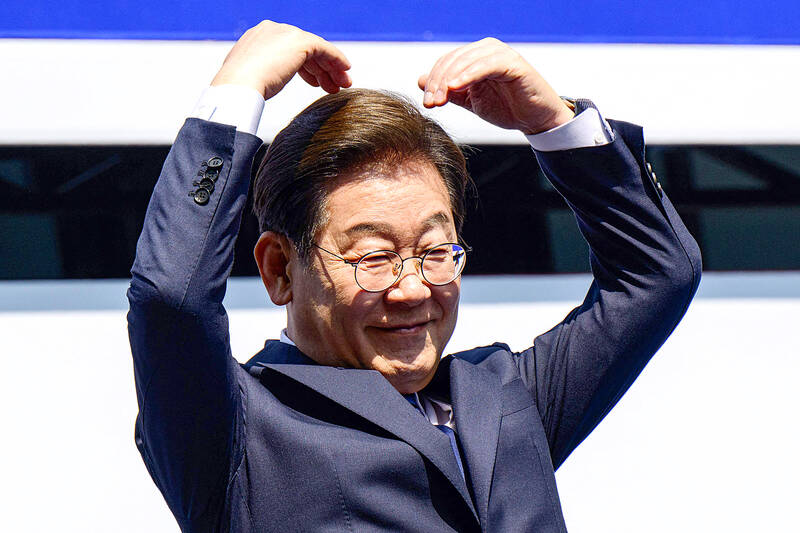Contenders for South Korea’s presidency yesterday commenced their campaigns, vowing to unify a deeply polarized society and spur economic growth, while navigating trade negotiations with the US.
Asia’s fourth-largest economy is to hold a snap presidential election on June 3 to choose former South Korean president Yoon Suk-yeol’s successor after the conservative leader was ousted over his shock martial law order that plunged the nation into a political crisis.
Surrounded by a huge crowd of supporters dressed in blue, front-runner Lee Jae-myung from the liberal Democratic Party rallied in the center of the capital, Seoul.

Photo: AFP
Some supporters danced to campaign songs, while others chanted: “Lee Jae-myung, President.”
“Will you join the journey to a new start, a new path to hope?” Lee asked the crowd, changing into a pair of sneakers onstage to signal his hard work during the race.
Lee, who lost the previous presidential poll to Yoon, is now riding a wave of popular support after overcoming a knife attack, standing up to the martial law order and contesting criminal charges that have threatened to disqualify him from the race.
His ongoing trials on matters ranging from bribery to charges mostly linked to a US$1 billion property development scandal have been pushed back to after the polls.
Lee, wearing a bulletproof vest due to threats to his safety, promised to become the leader of unity and weather a trade crisis triggered by trade tariffs imposed by the administration of US President Donald Trump.
His party’s major policy proposals involve growing the economy with a focus on the artificial intelligence and K-pop culture industries.
If elected, Lee would seek to restore soured relations with North Korea, which is technically at war with the South, while expanding the nation’s diplomatic sphere into Europe, according to his party’s policy pledges.
Kim Moon-soo, Lee’s conservative rival, began his campaign at a public wholesale market in Seoul, eating sausage soup with merchants and promising to revive small businesses in the slowing economy.
After a tumultuous week that required merging his campaign with a former prime minister who was also scheduled to run, the former South Korean minister of employment and labor has officially become the presidential candidate from the major right-wing People Power Party.
Yoon on Sunday publicly endorsed Kim to fight “the giant opposition party,” but his support has garnered criticism from some party members who want the party to kick out the ousted leader.
Job creation and a business-friendly environment are Kim’s key policy proposals. If elected, he has proposed an immediate summit meeting with Trump to negotiate tariffs.
Kim said he would focus on strengthening the security alliance with the US, but also seek a path for the nation to potentially pursue nuclear armament by securing the right to reprocess nuclear fuel, a major step toward building nuclear weapons.

Four people jailed in the landmark Hong Kong national security trial of "47 democrats" accused of conspiracy to commit subversion were freed today after more than four years behind bars, the second group to be released in a month. Among those freed was long-time political and LGBTQ activist Jimmy Sham (岑子杰), who also led one of Hong Kong’s largest pro-democracy groups, the Civil Human Rights Front, which disbanded in 2021. "Let me spend some time with my family," Sham said after arriving at his home in the Kowloon district of Jordan. "I don’t know how to plan ahead because, to me, it feels

The collapse of the Swiss Birch glacier serves as a chilling warning of the escalating dangers faced by communities worldwide living under the shadow of fragile ice, particularly in Asia, experts said. Footage of the collapse on Wednesday showed a huge cloud of ice and rubble hurtling down the mountainside into the hamlet of Blatten. Swiss Development Cooperation disaster risk reduction adviser Ali Neumann said that while the role of climate change in the case of Blatten “still needs to be investigated,” the wider impacts were clear on the cryosphere — the part of the world covered by frozen water. “Climate change and

Poland is set to hold a presidential runoff election today between two candidates offering starkly different visions for the country’s future. The winner would succeed Polish President Andrzej Duda, a conservative who is finishing his second and final term. The outcome would determine whether Poland embraces a nationalist populist trajectory or pivots more fully toward liberal, pro-European policies. An exit poll by Ipsos would be released when polls close today at 9pm local time, with a margin of error of plus or minus 2 percentage points. Final results are expected tomorrow. Whoever wins can be expected to either help or hinder the

DENIAL: Musk said that the ‘New York Times was lying their ass off,’ after it reported he used so much drugs that he developed bladder problems Elon Musk on Saturday denied a report that he used ketamine and other drugs extensively last year on the US presidential campaign trail. The New York Times on Friday reported that the billionaire adviser to US President Donald Trump used so much ketamine, a powerful anesthetic, that he developed bladder problems. The newspaper said the world’s richest person also took ecstasy and mushrooms, and traveled with a pill box last year, adding that it was not known whether Musk also took drugs while heading the so-called US Department of Government Efficiency (DOGE) after Trump took power in January. In a